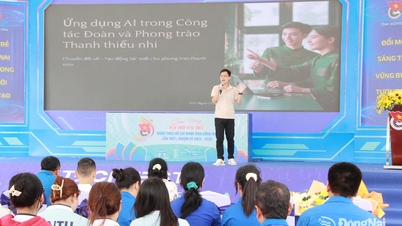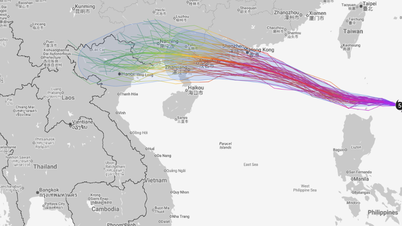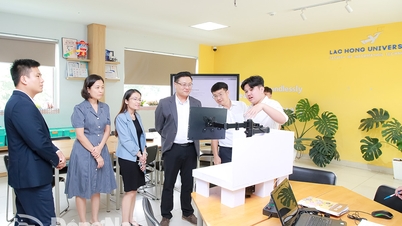On the morning of September 10, Rikkeisoft organized the Rikkei Global Summit 2025 event, bringing together leading domestic and international experts to discuss the future of the technology industry in the era of artificial intelligence (AI).
At the event, experts expressed that the traditional software outsourcing model based on low-cost advantages has come to an end in the AI era; to survive and develop, Vietnamese enterprises are forced to shift from the role of employees to co-creators, selling intelligence and solutions instead of selling working hours.
The event took place in the context of the global software outsourcing industry expected to reach a scale of more than 1,000 billion USD this year. However, this huge market size also comes with "survival" challenges.
When AI asks the question "Why do we need you?"

Mr. Nguyen Huy Dung, full-time member of the Central Steering Committee for Science and Technology Development, shared at the event (Photo: Organizing Committee).
Mr. Nguyen Huy Dung, a member of the Central Steering Committee for Science and Technology Development, said that new-generation AI systems are breaking three immutable laws that have shaped the software outsourcing industry: Scarcity of talent, geographical cost advantage, and the irreplaceability of human intelligence.
AI and low-code platforms are rapidly automating the physical layer (writing code), which has traditionally been the domain of software engineers. This is causing a dramatic shift in value to the upper layers: the logical layer (system design) and the conceptual layer (understanding business operations).
Mr. Dung quoted a weighty question from a CEO of a corporation in the Top Fortune 500 (500 companies with the highest revenue in the world ) to his outsourcing partner: "If AI can do this job automatically, why do we need you?".
“This question shows that the battle in the next decade is no longer a competition on low prices, but a fierce competition on value,” Mr. Dung expressed.
The only way, according to Mr. Nguyen Huy Dung, is to move up from being a physical level worker to becoming a co-creator at the conceptual level.
"That journey is from transaction to transformation, instead of just receiving design and writing code, businesses have to sit at the table with customers to define the problem, sell intelligence and solutions.
A recent survey also showed that 81% of businesses want their outsourcing partners to be strategic collaborators, not just pure suppliers,” he emphasized.
The "exponential" race

Mr. Ta Son Tung, Chairman of the Board of Directors of Rikkeisoft, shared at the event (Photo: Organizing Committee).
During the discussion session, international experts focused on analyzing strategies for businesses to survive and thrive.
The "5 M" strategic framework - Medium, Magic, Market, Money and Meaning - has been put forward for businesses to position themselves.
In particular, the "magic" element - a unique strength that cannot be copied - was agreed by the speakers that in the AI era, "magic" does not come from technology, but from people.
This means a deep understanding of expertise, the ability to build strong relationships with clients, curiosity and the discipline to constantly try new things.
An “exponential reality” model is used to illustrate the difference between trying a little harder and falling a little slower every day. In the age of AI, this differentiation is happening at a faster rate, so slowing down can mean being eliminated.
To stay ahead, investing in people is key for businesses. This includes continuous training, building a clear data strategy, and nurturing imagination.
Source: https://dantri.com.vn/cong-nghe/ky-nguyen-cua-ky-su-it-thuan-tuy-sap-ket-thuc-20251010164349710.htm



![[Photo] Opening of the World Cultural Festival in Hanoi](https://vphoto.vietnam.vn/thumb/1200x675/vietnam/resource/IMAGE/2025/10/10/1760113426728_ndo_br_lehoi-khaimac-jpg.webp)
![[Photo] Ho Chi Minh City is brilliant with flags and flowers on the eve of the 1st Party Congress, term 2025-2030](https://vphoto.vietnam.vn/thumb/1200x675/vietnam/resource/IMAGE/2025/10/10/1760102923219_ndo_br_thiet-ke-chua-co-ten-43-png.webp)


![[Photo] Unique Phu Gia horse hat weaving craft](https://vphoto.vietnam.vn/thumb/1200x675/vietnam/resource/IMAGE/2025/10/10/1760084018320_ndo_br_01-jpg.webp)
































































































Comment (0)